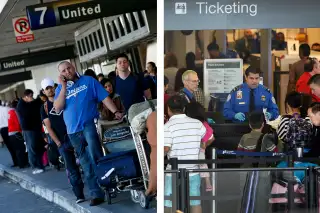Know Your Rights: Here's What an Airline Owes You When You Get Bumped

Airlines have a lot of leeway when it comes to denying passengers entry onto an aircraft. The recent incident on the United Airlines' Sunday flight to Louisville was a dramatic example of how far an airline can carry a situation once it decides to act.
But passengers do have some rights when they find themselves bumped off a flight—particularly if the removal stems from the airline's own overbooking practices. While United now says that Sunday's Chicago-St. Louis flight was not actually overbooked, overbooking of flights is increasing, says Henrik Zillmer, CEO of passenger assistance site AirHelp.com. "There will be much more of this in the future, so people really need to know what to do and what they're entitled to," Zillmer says.
Here's how to protect yourself next time you fly.
Know Your Rights
There are federal Department of Transportation rules that govern how airlines must treat you when a flight is overbooked—but you can't rely on the airline personnel to know and respect your rights, Zillmer says. "In most cases, the ground staff for airlines are not aware of the law," he says. "They simply don't know how the law is applied in every situation."
What airlines are required to do:
- They must ask for volunteers. Before removing customers from an overbooked flight, regulations require airlines to ask passengers to give up their seats voluntarily. Those airline offers can be very tempting, although AirHelp.com notes that by taking these offers you could be giving up your right to any additional compensation. If the airline cannot find enough volunteers, then they can start removing passengers.
- They must spell out your rights. This should be a written statement explaining why you're being bumped and your rights to compensation.
- They must rebook you—and pay you if you'll be significantly delayed. If the removal is involuntary and you'll be more than one hour late to your destination, the federal government spells out what the airline needs to shell out. The max is $1,350 if the alternate routing gets you to your final destination more than two hours later than planned (four hours for international flights). Note that's more than the airline is likely to offer for voluntary rebookings, says Charles Leocha of Travelers United, a nonprofit that advocates for passenger rights. (In the case of Sunday's United flight, the crew eventually offered passengers $800 vouchers.) "They're trying to be cheap," Leocha says. "It's absolutely wrong."
- They must cut you a check if you ask. You don’t have to accept vouchers, the U.S. Department of Transportation says. This is especially important to know if you don’t fly often. And you should be able to collect your compensation right at the airport at the time of removal, rather than filing a claim with the airline after the fact, according to AirHelp.com. (But if you don’t, hold onto all of your documents and keep notes on what exactly took place.)
Know the Caveats
The above rules have some limitations. The compensation rules are only for involuntary removals, for one thing—if you accept a voluntary offer, you're on your own. If the alternate flight you're placed on gets to your final destination less than an hour after the original flight's scheduled time, the feds don't require that you be given anything for your trouble.
Additionally, if an airline bumps you for any other reason than overbooking—if they switch to a smaller plane, if they remove you for the weight-and-balance issues that occur on smaller planes, or if your flight is simply delayed or canceled—the protections don’t apply.
Know When You Could Be Penalized
Another thing to understand: If you are removed from the flight, go quietly and collect your check, because the time for arguing is over—especially if you’re already aboard the aircraft, as was the case with Sunday’s flight.
Failing to cooperate can carry a hefty price tag. Federal aviation regulations state that "no person may assault, threaten, intimidate, or interfere with a crewmember in the performance of the crewmember's duties aboard an aircraft being operated." Airlines interpret that to mean they can pretty much remove any passenger from an airplane for a wide variety of reasons, and regulators and local law enforcement generally back them up.
So if you are removed from a flight as an “unruly passenger”—last year 79 people qualified, according to the FAA—you could face fines of up to $25,000.
Know How to Keep Your Seat
Sunday's situation was unusual, of course. "It's very rare ... that you would be boarded and then be kicked off," Zillmer says, noting that the process generally occurs at the gate before everyone is allowed to board the aircraft.
If you want to avoid getting bumped, Zillmer recommends signing up for airline loyalty programs, as carriers are much more likely to target non-regular passengers for removal. "I promise you, that guy was not a United loyalty member," he says. Indeed, the federal rules allow airlines to set their own “boarding priorities” in cases of overbooking. United's website, for instance, says it generally chooses to bump passengers based on “fare class, itinerary, status of frequent flyer program membership.”
"This is an ongoing issue," Leocha adds. "There's a lot more bumping going on today than we've ever had in the past."